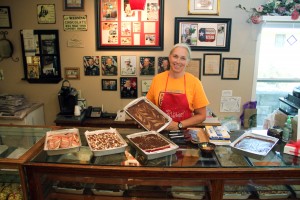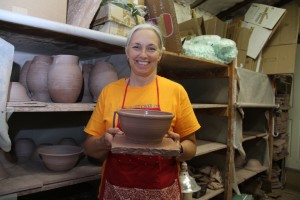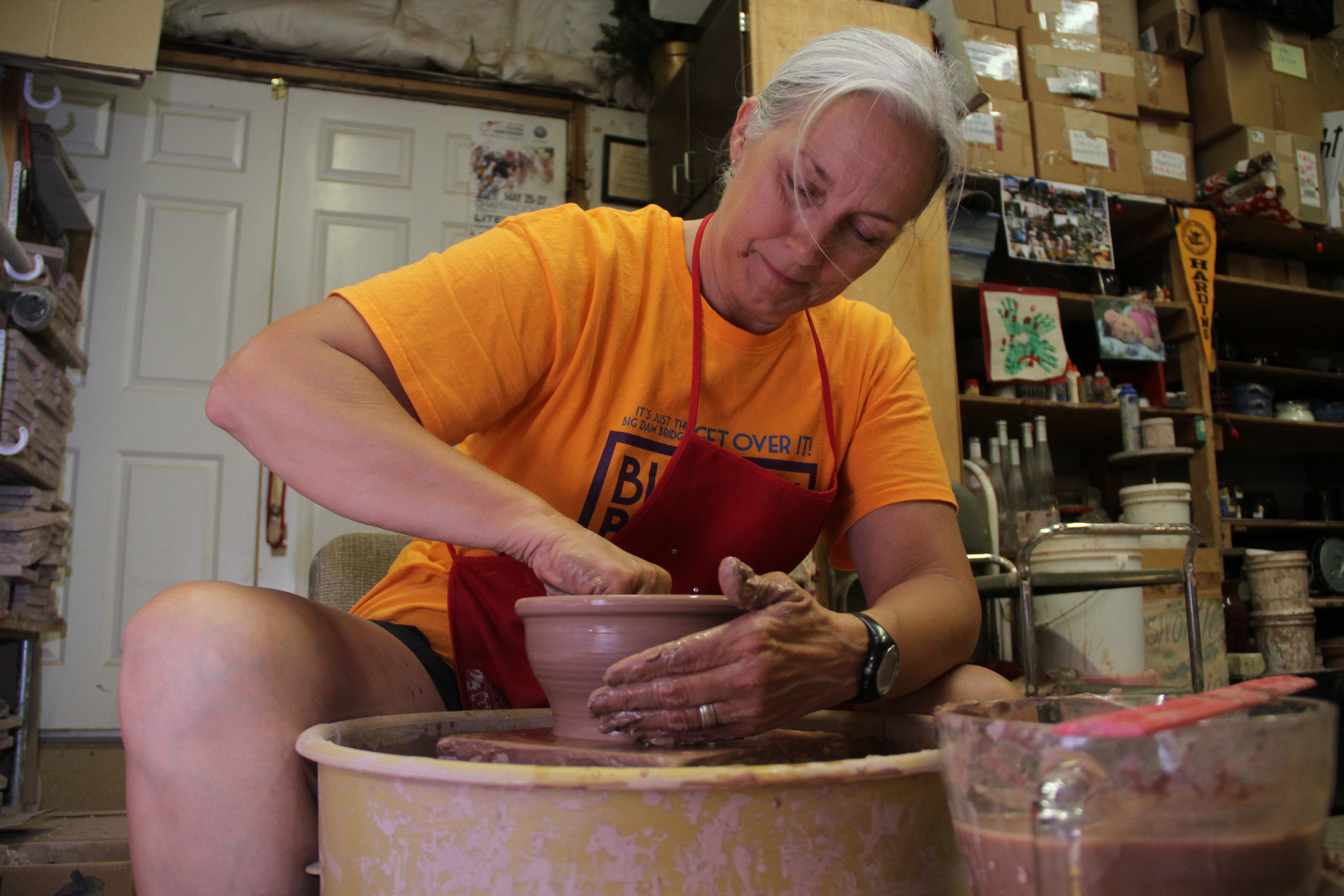Silver hair tied back in a loose ponytail, a few strands sweep across a woman’s face as she leans over the wheel. Wearing a red apron with the word “sister” stitched across the front, Titia Califano shares the journey of faith that led her to become a potter and an unexpected fudge maker.
Califano’s passion for pottery began in childhood. She lived next to Coleman Creek, where as a child she dug up clay and shale. By second grade she discovered her dream of becoming an artist. Although she practiced art at Little Rock Central High School, Califano didn’t fully pursue it until 1981 at Harding University in Arkansas.
Califano’s professor, Paul Pitt, was her mentor. She would sit for countless hours watching the movements of his hands work the clay. “My hands hit the clay, and I said, ‘This is it,’” she said.

Califano’s pottery plans were put on hold for 11 years as she followed her husband’s pursuit in ministry. He was a pulpit preacher and she was a preacher’s wife. Faced with the frustration of an unprogressive congregation, the Califanos began to apply for ministry positions at other churches. When no offers came, they decided it was time for Califano to pursue her own dream. Little did she know, it would become a ministry as well.
She spotted property for sale in Salado, but at the time, her family was facing eviction from their home and couldn’t afford it. Califano worked multiple part-time jobs while her husband struggled to run a new furniture business. Opening up a pottery shop seemed impossible.
Just when it seemed time to pass up the property, the family received a check from a young couple who had heard about Califano’s interest in purchasing the shop. The young couple was interested in using the front room of the building for a cappuccino business. It was just enough for a down payment. One of the couple’s relatives even wrote a check to help Califano purchase a kiln.
Generosity from the community didn’t stop there.
With only 30 days left to raise the money needed to open the business, Califano received cash and checks from family and friends. Some knew they would be paid back and others didn’t want repayment.
“People would come up to me and say, ‘Are you Titia?’ and I’d say yes, and then they’d grab me, put money in my hand and start praying with me in the middle of the store,” Califano said.
When she would ask for their names, they often replied, “That’s not important. You just know that God told us to do this.”
Califano was grateful for all of the help she received, but with every donated dollar came more responsibility.
“It was so scary,” Califano said. “I was in tears thinking that everything is going to have to come from my hands to provide for this entire family and I had never had that responsibility in my life.”
For two and a half years, Califano, her husband and four children lived in a 350-square-foot room in the back of the shop, trying to get business at the Village Potter to pick up.
Still, the community provided. An elderly couple would often call to check up on Califano and offer to buy toilet paper and other grocery items for the family.
“I bet you’re out of toothpaste too,” the elderly woman said. “And you need some more pimento cheese and moon pies for those kids.”
Neighbors would bring food and offer favors, like letting Califano charge and pay later at Westside Drug store when her children got sick so they could have medicine.
“It was the biggest walk of faith I’ve ever done,” she said. “But I figured if we were being evicted and creditors were calling and we were losing everything anyway, what does it matter? Let’s go for it.”
In 1986, Sir Wigglesworth’s Fudge, the popular fudge shop in downtown Salado, was about to close its doors. Califano stopped by with the intention of purchasing a glass display case she could use to showcase her pottery at her store. The owner of the fudge shop, however, had different plans for Califano. She asked her to take over the business.
“I left rolling my eyes at the thought of taking over the fudge business,” she said. But the owner, Susan Stockton, did not give up. She called her every two weeks to ask, “Well, what did you sell today?”
When Califano would tell her she sold less than $50 on any given day, Stockton would ask how she was surviving on that kind of profit.

“The Lord works it out at the end of the month,” she recalls telling her.
But Califano couldn’t deny that her pottery business could be better. Soon after, she decided to take over Stockton’s fudge business and learned how to make homemade fudge. She sold her building and moved into a new one complete with a pottery room, fudge kitchen and a new name, Mud Pies Pottery.
Califano’s stepdaughter, Amie Dunn, recalls her children’s reactions to their granny throwing pottery.
“When the girls were little it was the first time they had seen her throw pottery,” Dunn said. “Hailey, who was 2 at the time, said, ‘Why you all muddy, granny?’ Ever since then she was muddy granny.”
“People always wanted to know if she made mud pies,” Dunn said with a laugh. “It was always a running joke and when she got the fudge business the fudge looked like mud pies.”
Before Stockton passed away, Califano asked if she could have the sign from the old Wigglesworth’s business: a big wooden painting adorned with bunnies sitting in a pumpkin patch. Today, the freshly repainted sign sits outside of Mud Pies Pottery and reads “home of Sir Wigglesworth’s Homemade Fudge.”
“In 2003, and for the first three months, I wondered if I was still a potter because everyone was coming in for fudge and not much pottery,” Califano said. “But now it’s different.”
As the business grew, customers entered Mud Pies Pottery understanding they weren’t just getting fudge and pottery, but also a piece of Califano’s ministry hidden within.
Isaiah 64:8 is etched on the bottom of all Califano’s pieces, referencing the verse, “We are the clay, you are the potter; we are all the work of your hand.”
Just like trying to center the clay on the pottery wheel, “when your life is centered it just sits there and hums,” Califano said.
“When you have issues and it’s off balance then your life isn’t centered in Christ,” she continued. “You can still kind of throw a vessel, but it’s going to be thick on one side and thin on the other, and it’s not going to be as stable and strong.”
When customers come into her store, Califano sees it as an opportunity to share the Gospel. She asks herself, “How will I be his witness in my Jerusalem—where I work every day for the Savior, in my shop.”
Customers often ask if she makes all of her wares.
Califano usually responds, “Not by my strength, not by my might, but by the power of the Holy Spirit.”
One particular moment Califano remembers is her response to a man, Al Hoeksema, who is also a potter, who questioned if God actually helped her make all of the fudge.
“This business wouldn’t be here without him,” she recalls telling him. “It’s his business, his money, his clay, everything.”
Hoeksema said he respects the manner in which she uses faith to run her business.
“She focuses on her faith and is more of a spiritual potter,” he said. “She invited me to throw pottery for her when I needed work.”
Califano’s journey has been a bumpy one, but she recognizes that it was all a part of God’s plan.
“In the same sense of the word, it’s not about me, it’s about him,” she said. “I’m supposed to shine for Christ and for God through every circumstance.”

